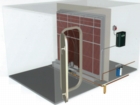Evaporative humidifier has a very low energy consumption

Very low power consumption and up to 12 K of evaporative cooling — the HumEvap MC3 evaporative humidifier from JS Humidifiers.
An evaporative humidifier from JS Humidifiers is said to have an energy consumption 150 times less than equivalent electric steam humidifiers. The HumEvap MC3 is installed inside a duct or air-handling unit and humidifies by passing air through a wetted fibre matrix. It is suitable for any size of duct and can deliver huge volumes of moisture to an atmosphere and runs on just 500 W. These humidifiers can provide up to 12 K of evaporative cooling to the air being humidified. A PureFlo Ag+ silver-ion dosing system prevents the build-up of micro-organisms and bacteria and does not require a power supply. The newly developed Agentsan technology self-regulates the amount of silver ions that are release into the water and prevents over-dosing. This humidifier is said to be the only one of its kind to have obtained both WRAS and VDI 6022(D) RLT hygiene certification. The control panel can be up to 100 m away and gives digital control of relative humidity and temperature of the leaving air. It also controls flush, drain and water-quality maintenance features. There is a 24-hour, 7-day programmable timer. Evaporation from this humidifier is said to be instant, so it can be installed in very short sections of duct without the risk of condensation forming on duct bends.
Related links:
Related articles:








